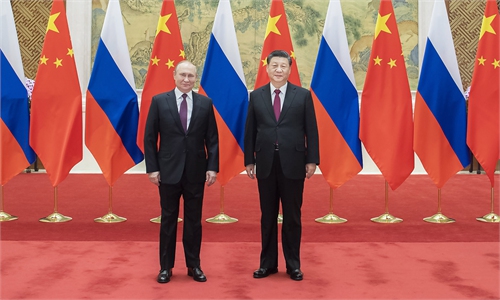China, Russia accelerate energy cooperation amid deepened interdependency of two economies
Eastern Gas Pipeline now is in full swing

The construction site of China-Russia east-route natural gas pipeline in Heihe, Northeast China's Heilongjiang Province File photo: VCG
New energy cooperation projects are being carried out in full swing between China and Russia as the interdependency of the two economies has been strengthened following the meeting of the countries' top leaders during the 2022 Beijing Winter Olympics.
Energy is the biggest area of bilateral cooperation and multidimensional energy cooperation is making new gains as the two countries continue to boost their friendly partnerships, experts said.
An underwater shield-crossing project that passes through the Yangtze River of the China-Russia Eastern Gas Pipeline is in full swing, which is the key project of the southern section of the China-Russia Eastern Gas Pipeline. It has a total length of 10.226 kilometers, and it's the longest tunnel under construction across the Yangtze River.
The pipeline is a major strategic project contributing to China-Russia energy cooperation, which was agreed on and highlighted by the heads of both countries, who noted its significance for deepening all-round cooperation between the two countries and promoting the integration of their interests.
The project, with the northern, middle and southern sections built in phases, has a total length of 5,111 km, starting at the China-Russia border in Heihe City, Northeast China's Heilongjiang Province, passing through nine provinces and cities, including Northeast China's Jilin Province and East China's Jiangsu Province, and ending in Shanghai.
On February 3, China National Petroleum Corp (CNPC) and Russia's Gazprom signed an agreement on the purchase and sale of gas from the Russian Far East, another important result of cooperation in gas trade.
Under the agreement, Russia will increase its pipeline gas supply to China by 10 billion cubic meters a year, which, together with the "Siberian Power" pipeline, will bring total gas supply to China to 48 cubic meters per year.
In terms of oil cooperation, CNPC and Russia's Rosneft Oil signed a supplementary agreement on the purchase and sale of crude oil. According to the agreement, Russia will continue to supply 100 million tons of crude oil to China via Kazakhstan for a period of 10 years.
As of January, CNPC had imported more than 300 million tons of crude oil and more than 15 cubic meters of natural gas from Russia by pipeline.
"Oil and gas cooperation is the biggest area of cooperation between China and Russia, due to the huge complementarity of the two nations in the energy sector," Lin Boqiang, director of the China Center for Energy Economics Research at Xiamen University, told the Global Times on Thursday.
The export of energy products has always been an important part of Russia's fiscal revenue and tensions with Ukraine have reduced the scope for Russian energy exports to Europe. In this context, China provides a big market for Russian gas and oil, Lin said.
The friendly bilateral relations also add to energy security for China, which will greatly benefit its economic growth, Lin said.
Due to certain advantages, this partnership involving the exchange of markets and resources is also expected to expand, as China's demand for Russian oil and gas continues and the two sides may explore further cooperation in renewable energy and other fields, Lin said.
Russia is also China's main source of imported coal. And, China and Russia have escalated cooperation in the field of nuclear energy, including the Tianwan Nuclear Power Plant in Lianyungang, East China's Jiangsu Province and the Xudabao Nuclear Power Plant in Huludao, Northeast China's Liaoning Province.
China-Russia bilateral trade in 2021 grew 35.9 percent year-on-year, reaching $146.8 billion, exceeding the threshold of $140 billion for the first time, an all-time high, official data showed. The two nations have set a goal of reaching $200 billion in bilateral trade by 2024.
China will work with Russia to promote cooperation in trade, energy, agriculture, science and technology, aerospace, digital connectivity and finance, moving toward the $200 billion trade target at an earlier date, a spokesperson from China's Ministry of Commerce said in Beijing on Thursday.



